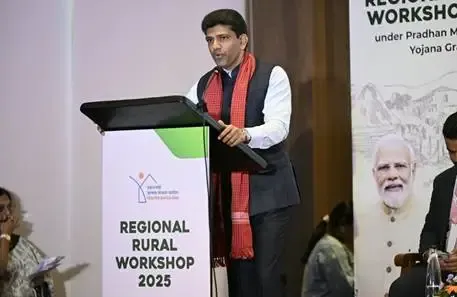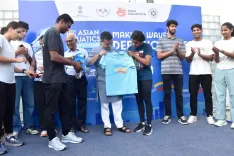How Many Houses for Rural Poor Have Been Sanctioned Under PMAY Scheme?

Synopsis
Key Takeaways
- 3.69 crore houses sanctioned under PMAY-Gramin.
- 2.76 crore homes completed so far.
- Ambitious target of 4.95 crore houses by March 2029.
- Integration with key initiatives for holistic development.
- Focus on skilled labor and economic empowerment.
Panaji, June 6 (NationPress) Union Minister of State for Rural Development and Communications Pemmasani Chandrasekhar announced that 3.69 crore houses have been approved, with 2.76 crore homes already completed under the Pradhan Mantri Awas Yojana–Gramin, turning the aspirations of the rural poor into reality.
The Minister highlighted the ambitious target of 4.95 crore houses by March 2029, stating, "Each figure signifies a family enjoying peaceful sleep, children studying safely, and elders living with dignity."
During a regional rural workshop for the Pradhan Mantri Awas Yojana-Gramin, he remarked, "As our villages thrive, so does Bharat. Under PM Narendra Modi's transformative vision, this scheme embodies the essence of Antyodaya—uplifting the most marginalized. A Viksit Bharat (developed India) cannot be achieved without empowered rural communities."
The Minister elaborated on the government's strategy of integrating PMAY-G with flagship initiatives like Ujjwala, Jal Jeevan Mission, and Swachh Bharat to foster comprehensive habitats, ensuring all rural families have access to clean water, sanitation, and clean cooking fuel.
He emphasized that the vision extends beyond mere construction. Through mason training programs, the government is cultivating a workforce of skilled artisans in rural areas. This initiative represents economic empowerment, creating jobs, fostering expertise, and enabling rural youth to write their own success stories.
The Minister also mentioned exploring Green Housing, which merges environmental awareness with affordable construction, creating homes that care for families and the planet. He highlighted the adoption of Artificial Intelligence in beneficiary selection, ensuring meritocracy prevails over influence in determining support.
He pointed out that the government is aligning its policies with the Sustainable Development Goals, connecting local aspirations with global responsibilities for every village to contribute to humanity's progress. The government is also reimagining microfinance as a vital link to translate rural aspirations into tangible opportunities, enabling individuals to realize their dreams.
“As we enter the Amrit Kaal, our focus is shifting from mere numbers to quality, sustainability, and long-term impact. By embracing innovation, data, and inclusive financing, we are shaping rural development. Each family transitioning from kutcha to pucca houses through effective convergence is a step towards national transformation,” he concluded.
Goa Chief Minister Pramod Sawant, along with state Rural Development, Culture, and Sports Minister Govind Gaude and senior officials from both the Central and state governments, attended the event.






